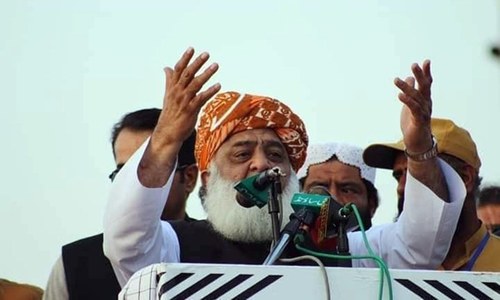
LAHORE: Special Assistant to the Prime Minister on Information Dr Firdous Ashiq Awan says JUI-F chief Maulana Fazlur Rehman is actually planning to organise a march for “freedom of some families” and not for the people of occupied Kashmir.
“Maulana Fazl is lending his shoulder to those languishing in jails or under NAB [National Accountability Bureau] custody,” Dr Awan said at a meeting with a group of senior journalists at the Governor House on Saturday.
Although Prime Minister Imran Khan instructed his political aides to keep a channel of dialogue with the JUI-F chief open, she said the government would not enter into any negotiations for “anyone’s vested interest or getting relief in court and NAB cases”.
“The government will discourage such a dialogue,” she said and added that the cases in courts and NAB would take their course.
Special assistant to the prime minister promises to solve media issues
Stating that the government would not stop him from exercising his democratic right of holding a march, staging a sit-in or criticising the sitting government, Dr Awan asked Maulana Fazl to “at least make the agenda for his protest plan transparent”.
“The government will take 10 steps forward if the opposition will look for a dialogue on issues pertaining to national interest or welfare of the people,” she said.
Referring to criticism in media of the PTI government for opposing the planned sit-in, Dr Awan said Mr Khan had staged a sit-in when the then government did not listen to his legitimate demands of opening four constituencies to verify whether rigging had been committed in the elections or not. She said Mr Khan had exhausted all options including courts before going for the protest.
When asked whether or not the government planned to stop the JUI-F’s “Azadi March” by force, she said the provincial governments had the legal and constitutional mandate to ensure law and order and protect public life and property.
Explaining the PTI-led government’s measures aimed to revive the economy, ranging from seeking help from friendly countries to going to the IMF and reviving business relations with China, Dr Awan said the government had established the long-awaited CPEC Authority to show that Pakistan was serious in implementing the projects.
“This is not only in the interest of China but also Pakistan,” she added.
The prime minister’s special assistant said that during its first year the PTI government faced severe criticism for not going to the IMF, preferring instead to go to some friendly countries to enhance foreign exchange reserves. “In the initial days of the government, it was not able to negotiate with the IMF as every economic indicator in the country was negative,” she said.
Dr Awan said the government let the rupee stabilise itself instead of throwing foreign reserves at it to maintain its “artificial position”.
She said the prime minister himself was holding meetings with his economic team on a weekly basis and bridging the inter-ministerial gaps to get things going. “The PTI government had to go for surgery to ensure economic stability and it remains painful for many,” she said.
Admitting that joblessness was still a big challenge, she claimed the government had revived the textile industry and 103 companies had recently shown profits.
In response to a question about the media industry crisis that had led to the layoff of 9,000 journalists and media workers, massive cuts in salaries and delayed payment of salaries, Dr Awan said some elements had urged the prime minister not to pay advertisement bills of the previous government.
Still, Mr Khan gave orders that the pending bills be paid and they were paid in three phases. She admitted that the bills had yet to be paid completely.
She said the payment of pending and fresh advertisement bills would be linked to timely payment of salaries.
Dr Awan said the prime minister was holding meetings with the owners of media houses and hoped the matter would be resolved soon.
Published in Dawn, October 13th, 2019














































